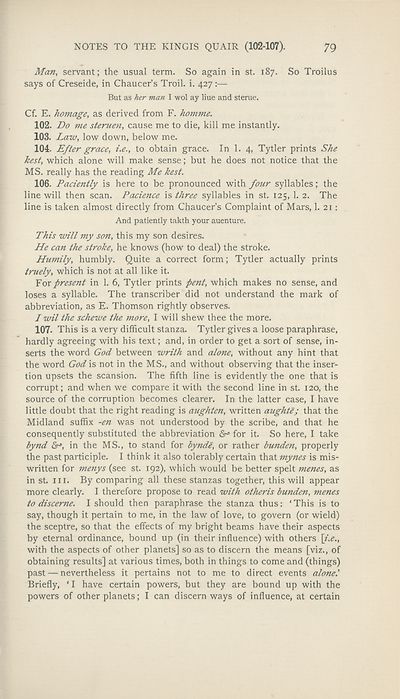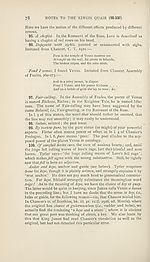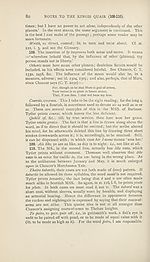Download files
Complete book:
Individual page:
Thumbnail gallery: Grid view | List view

NOTES TO THE KINGIS QUAIR (102-107).
79
Man, servant; the usual term. So again in st. 187. So Troilus
says of Creseide, in Chaucer’s Troil. i. 427:—
But as her man I wol ay Hue and sterue.
Cf. E. homage, as derived from F. homnie.
102. Do me steruen, cause me to die, kill me instantly.
103. Law, low down, below me.
104. Efter grace, i.e., to obtain grace. In 1. 4, Tytler prints She
kest, which alone will make sense; but he does not notice that the
MS. really has the reading Me kest.
106. Paciently is here to be pronounced with four syllables; the
line will then scan. Pacience \s three syllables in st. 125, 1. 2. The
line is taken almost directly from Chaucer’s Complaint of Mars, 1. 21:
And patiently takth your auenture.
This will my son, this my son desires.
He can the stroke, he knows (how to deal) the stroke.
Humily, humbly. Quite a correct form; Tytler actually prints
truely, which is not at all like it.
Y ox present in 1. 6, Tytler prints pent, which makes no sense, and
loses a syllable. The transcriber did not understand the mark of
abbreviation, as E. Thomson rightly observes.
/ wil the schewe the more, I will shew thee the more.
107. This is a very difficult stanza. Tytler gives a loose paraphrase,
hardly agreeing with his text; and, in order to get a sort of sense, in¬
serts the word God between writh and alone, without any hint that
the word God is not in the MS., and without observing that the inser¬
tion upsets the scansion. The fifth line is evidently the one that is
corrupt; and when we compare it with the second line in st. 120, the
source of the corruption becomes clearer. In the latter case, I have
little doubt that the right reading is aughten, written aughte; that the
Midland suffix -en was not understood by the scribe, and that he
consequently substituted the abbreviation & for it. So here, I take
hynd &*, in the MS., to stand for bynde, or rather butiden, properly
the past participle. I think it also tolerably certain that mynes is mis¬
written for menys (see st. 192), which would be better spelt menes, as
in st. in. By comparing all these stanzas together, this will appear
more clearly. I therefore propose to read with otheris bunden, menes
to discerne. I should then paraphrase the stanza thus: ‘This is to
say, though it pertain to me, in the law of love, to govern (or wield)
the sceptre, so that the effects of my bright beams have their aspects
by eternal ordinance, bound up (in their influence) with others \i.e.,
with the aspects of other planets] so as to discern the means [viz., of
obtaining results] at various times, both in things to come and (things)
past — nevertheless it pertains not to me to direct events alonel
Briefly, ‘ I have certain powers, but they are bound up with the
powers of other planets; I can discern ways of influence, at certain
79
Man, servant; the usual term. So again in st. 187. So Troilus
says of Creseide, in Chaucer’s Troil. i. 427:—
But as her man I wol ay Hue and sterue.
Cf. E. homage, as derived from F. homnie.
102. Do me steruen, cause me to die, kill me instantly.
103. Law, low down, below me.
104. Efter grace, i.e., to obtain grace. In 1. 4, Tytler prints She
kest, which alone will make sense; but he does not notice that the
MS. really has the reading Me kest.
106. Paciently is here to be pronounced with four syllables; the
line will then scan. Pacience \s three syllables in st. 125, 1. 2. The
line is taken almost directly from Chaucer’s Complaint of Mars, 1. 21:
And patiently takth your auenture.
This will my son, this my son desires.
He can the stroke, he knows (how to deal) the stroke.
Humily, humbly. Quite a correct form; Tytler actually prints
truely, which is not at all like it.
Y ox present in 1. 6, Tytler prints pent, which makes no sense, and
loses a syllable. The transcriber did not understand the mark of
abbreviation, as E. Thomson rightly observes.
/ wil the schewe the more, I will shew thee the more.
107. This is a very difficult stanza. Tytler gives a loose paraphrase,
hardly agreeing with his text; and, in order to get a sort of sense, in¬
serts the word God between writh and alone, without any hint that
the word God is not in the MS., and without observing that the inser¬
tion upsets the scansion. The fifth line is evidently the one that is
corrupt; and when we compare it with the second line in st. 120, the
source of the corruption becomes clearer. In the latter case, I have
little doubt that the right reading is aughten, written aughte; that the
Midland suffix -en was not understood by the scribe, and that he
consequently substituted the abbreviation & for it. So here, I take
hynd &*, in the MS., to stand for bynde, or rather butiden, properly
the past participle. I think it also tolerably certain that mynes is mis¬
written for menys (see st. 192), which would be better spelt menes, as
in st. in. By comparing all these stanzas together, this will appear
more clearly. I therefore propose to read with otheris bunden, menes
to discerne. I should then paraphrase the stanza thus: ‘This is to
say, though it pertain to me, in the law of love, to govern (or wield)
the sceptre, so that the effects of my bright beams have their aspects
by eternal ordinance, bound up (in their influence) with others \i.e.,
with the aspects of other planets] so as to discern the means [viz., of
obtaining results] at various times, both in things to come and (things)
past — nevertheless it pertains not to me to direct events alonel
Briefly, ‘ I have certain powers, but they are bound up with the
powers of other planets; I can discern ways of influence, at certain
Set display mode to: Large image | Zoom image | Transcription
Images and transcriptions on this page, including medium image downloads, may be used under the Creative Commons Attribution 4.0 International Licence unless otherwise stated. ![]()
| Publications by Scottish clubs > Scottish Text Society publications > Old series > Kingis quair > (139) |
|---|
| Permanent URL | https://digital.nls.uk/106994143 |
|---|
| Description | A collection of over 100 Scottish texts dating from around 1400 to 1700. Most titles are in Scots, and include editions of poetry, drama, and prose by major Scottish writers such as John Barbour, William Dunbar, Gavin Douglas, and George Buchanan. Edited by a key scholarly publisher of Scotland's literary history, and published from the late 19th century onwards by the Scottish Text Society. Available here are STS series 1-3. |
|---|

